Human Development & Family Science News
Impact Through Research
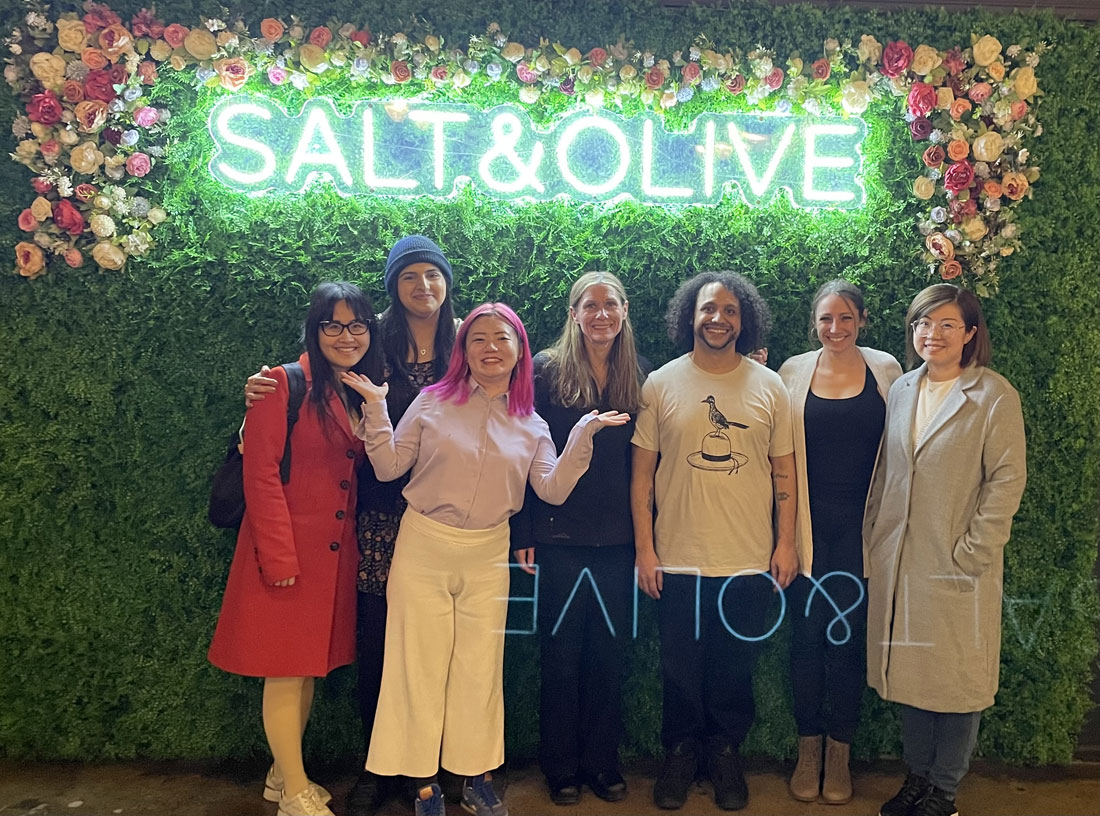
Linghua Jiang, Qingyang Liu, Sanum Shafi, Caitlin Smith, and Ying Xu presented at the conference in late March, with Smith attending through a fellowship provided by the National Science Foundation. Liu was also recently elected to the Society for Research in Child Development (SRCD) Student and Early Career Council and will serve on the council’s Science and Social Policy Committee.
“SRCD is the preeminent international conference for research in child development and it was wonderful to see our students well-represented in the program,” says Rachel Razza, Human Development and Family Science department chair and associate professor. “Their involvement reflects the quality of their scholarship, as proposals undergo a rigorous peer-review process that prioritizes leading-edge research and diversity, innovative methodology, and significant contribution to the field.
“The SRCD conference also offers graduate students a unique opportunity to connect with researchers from around the world, as there are ‘lunch with the leaders’ events and receptions dedicated to networking and professional development,” Razza adds.
Smith received the SRCD Early Career Transdisciplinary Fellowship, which supported her attendance at the SRCD Biennial Conference and the #HolisticDevScience Conference earlier this year. The fellowship is awarded to early career scholars who demonstrate a commitment to transdisciplinary, multi-sector, and translational research.
At the conference in Utah, Smith hosted a roundtable discussion on “Bridging the Divide Between Undergraduate Coursework and Research: A Synergistic and Scaffolded Approach” during the Teaching Institute pre-conference. We asked Smith to introduce herself and her research and discuss her experience at the conference and how it impacts her career path. Here’s what she wrote:
“I am a Ph.D. candidate in Human Development in Falk College, studying social and community influences on consumption behaviors, with a particular interest in how perceptions of health, self-efficacy, and environmental factors interact to affect food choice among children. I presented two posters and hosted a roundtable discussion at the 2023 SRCD Biennial Conference.
“During the SRCD Teaching Institute pre-conference, I hosted a roundtable discussion on bridging the gap between undergraduate coursework and research, building upon my own work integrating research methods into the introductory and elective courses I have taught. Alongside (Undergraduate Director and Associate Professor) Matthew Mulvaney, I also presented a poster on developing a career immersion trip for undergraduate students, based upon our experience with (Associate Professor) Eunjoo Jung on planning and effectively running a career immersion trip to New York City earlier this year.
“Finally, I presented a poster on my dissertation work during the SRCD Biennial Conference. The poster examines the intersecting influences of food availability, the family food environment, and self-efficacy on rates of produce consumption among children.
“At the SRCD Biennial Conference and the #HolisticDevScience Conference in the fall, I was able to connect with, and learn from, many other scholars who are committed to both translational and transdisciplinary scholarship, and innovative teaching. I look forward to continued collaboration with these scholars as I complete my dissertation and begin my job search, in which I hope to continue my community-engaged research while teaching.”
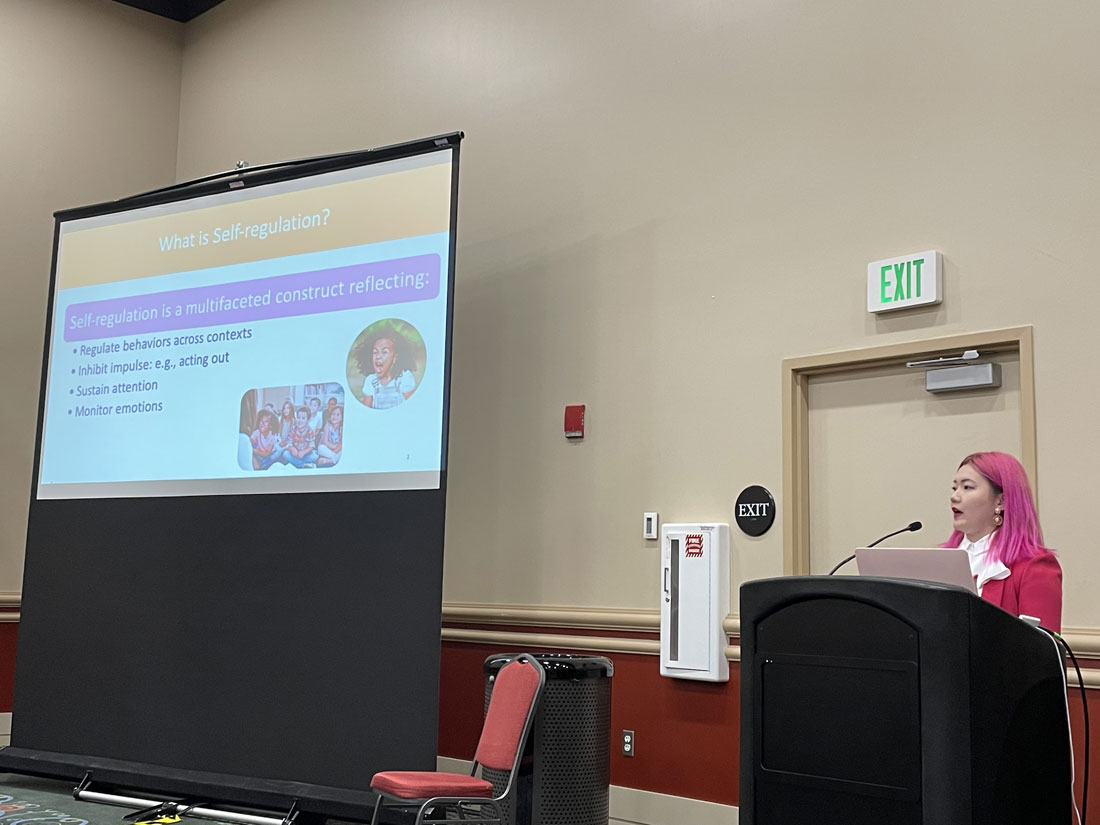
Liu Elected to Student and Early Career Council
Following a rigorous nomination process, Qingyang Liu was elected to the Student and Early Career Council (SECC) by SRCD members. The council represents student and early career interests on SRCD committees and fosters the development of student and early career scholars who are the future of interdisciplinary research on infant, child, and adolescent development in diverse contexts and across life-long trajectories.
Liu and the other SECC student representatives are listed on the SRCD website.
“Being selected to serve on the Science and Social Policy Committee is a wonderful honor for Qingyang and the HDFS graduate program,” Razza says. “We are excited to see how her enthusiasm for research helps shape the next generation of scholars!”
Interested in a career in human development? Visit the Department of Human Development and Family Science homepage to learn more about its academic programs, research and experiential learning, and career opportunities.
A Giant in Her Field
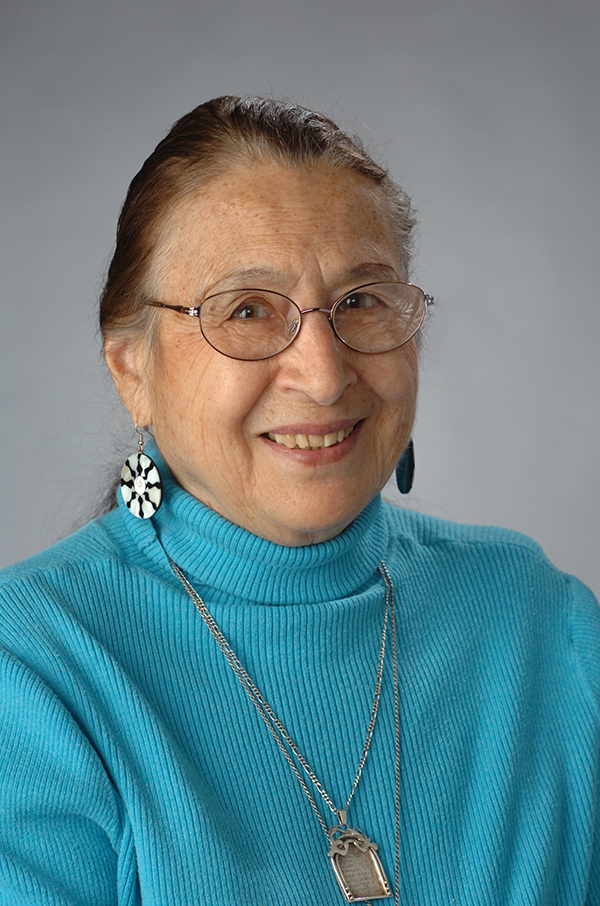
Alice Sterling Honig, Professor Emerita of child and family studies (now the Department of Human Development and Family Science) in the Falk College, died March 7, 2023. She was 93.
Honig earned a B.A. from Barnard College and a M.A. from Columbia University, both in experimental psychology, and a Ph.D. in developmental psychology from Syracuse University. Through her early training in the psychological sciences and academic career at Syracuse University that spanned over five decades, Honig was a champion for the rights, welfare, and the optimal development of young children.
“I will miss her smiles, her hugs, her jokes, her crystal-clear insights, and her clarity of thought,” says Professor of Practice Thom deLara. “Alice was a force to be reckoned with, but she handled it with humility and grace. I will miss her warm greetings and wonderful stories. The college has lost a giant in her field.”
Aligned with President Lyndon Johnson’s great war on poverty in the 1960s, Honig and her colleagues implemented one of the longest federally funded intervention programs aimed to ward off the pernicious effects of poverty on the social, emotional, cognitive, and physical development of young children in the Syracuse area. This program became a model for national initiatives to lift children out of poverty.
Honig was the graduate assistant of Syracuse University professor Bettye Caldwell who, with Julius Richmond of Upstate Medical University, formed the Children’s Center in Syracuse in 1967–the first early intervention program in the country and the foundation of Head Start. This also built the legacy of excellence in early childhood care at Syracuse University.
Working with Upstate Medical University pediatrician Frank Oski in the late 1970s, she assessed iron deficient infants and toddlers in a ground breaking trial showing cognitive and behavioral improvements after iron therapy. Following her interest in cross-cultural child-raising, she took part in Caldwell’s team of early childhood specialists invited to China to visit child care centers in 1975. She returned to Beijing at age 83 to teach about child development and present an award in her name.
Longtime colleagues of Honig remember her as a kind and compassionate person who expressed a deep sense of gratitude and humility. “Alice was a strong, brilliant woman who cared. Her work and her life were a blessing to children and families everywhere. She threw everyone she met a kiss,” recalls Teaching Professor Emeritus Joseph Fanelli.
Associate Professor Emerita Ellen deLara says, “Alice was a wonder, intellectually and personally. In her natural exuberance for life, she provided support for students and encouragement for junior scholars. In the darkest times, she still reached out with something quirky, funny, or uplifting. We have lost a treasure.”
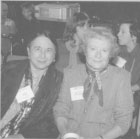
Equally impressive were her steadfast attempts to catalog and promote early education practices that are child-centered and embrace neo constructivist perspectives that enable children to be shaped and shape their own development. Her scholarly publications are used in child development and early childhood education programs to train students and other professionals in university and community settings across the world. Honig also served as an editor and editorial consultant on many professional journals and for book publishers, including her service as a editor of the research in review section of “Young Children” and associate editor of “Early Child Development and Care,” both prominent journals in her field.
Honig was a prolific scholar who assumed central roles in national and international organizations such as the National Association for the Education of Young Children (NAEYC) and Society for Research on Child Development (SRCD). Through keynote addresses and membership in governing bodies in these and other organizations, she conveyed that attending to the needs of children and families is at the heart of social justice. She was a sought-after speaker at conferences due to her breadth of knowledge and her ability to convey both theoretical and practical knowledge at a level that was comprehensible and engaging to both lay and professional audiences. Her international reputation was one of several factors contributing to the depth of participation by international students in the Department of Human Development and Family Science.
She actively worked with graduate and undergraduate students as an instructor and as a mentor for their professional and scholarly development. She developed many of Falk College’s core undergraduate and graduate courses–a reflection of her broad areas of interest and expertise in the field. Honig was always willing to share her knowledge and experiences with students and fellow faculty members to assist them in planning and implementing their courses. She served as a valued committee member on uncounted thesis, comprehensive examination, and dissertation committees in the Department of Human Development and Family Science and across the University. In the Department, her important contributions to the scholarly development of graduate students are honored with the Alice Sterling Honig Graduate Research Award given annually to the graduate student whose scholarly contributions are particularly meritorious.
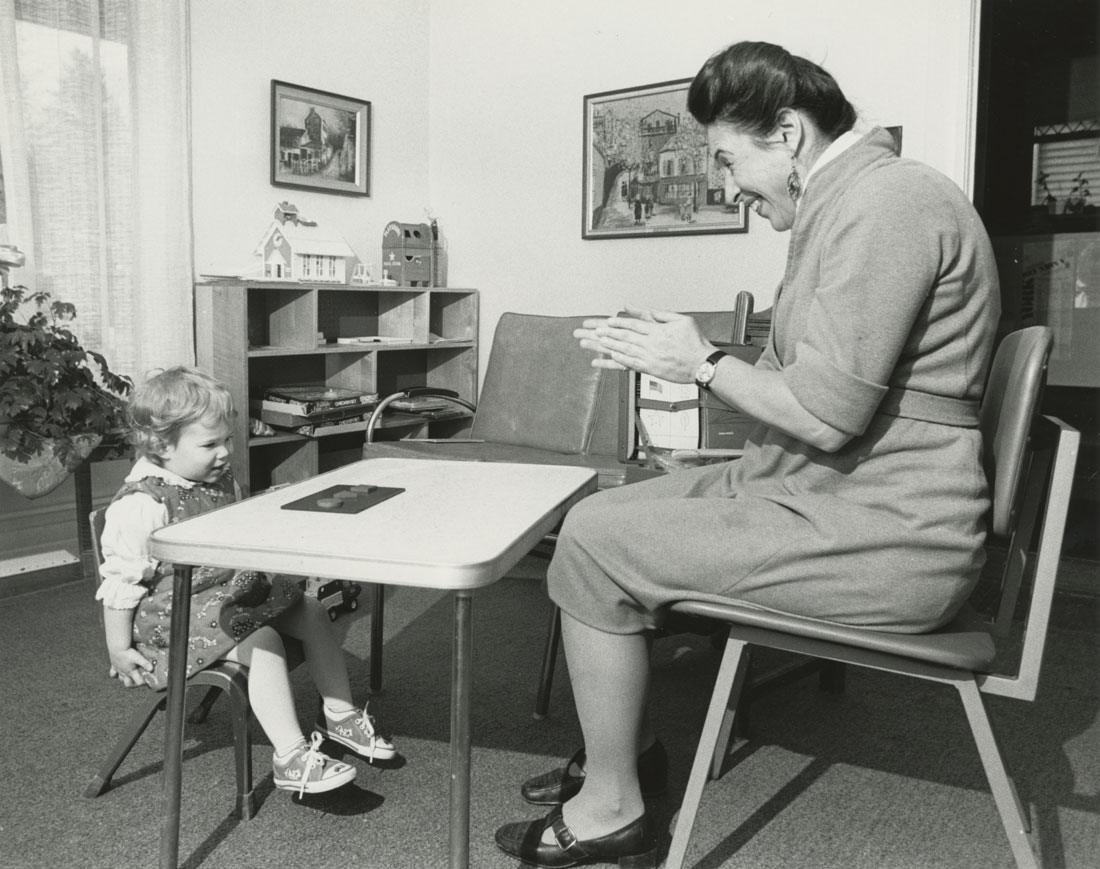
In addition to her scholarly and professional contributions, Honig was engaged in many community organizations and activities. She was an early researcher and supporter of Head Start programs and was actively involved in the boards of many daycare centers in the Syracuse community, especially those serving underprivileged populations and individuals whose familial and personal histories were affected by race and class prejudice.
Honig was also a talented musician who prided herself on her broad knowledge of lullabies and musical nursery rhymes from across the world–a knowledge she delighted in sharing with students, colleagues, and audiences. For many years, she was an active member of the Syracuse University Oratorio Society and was a key member of a local folk singing ensemble. She also was active in her religious community, sharing her insight and experiences at her Temples and with other religious organizations. Her intellectual curiosity went beyond the field of child development, extending into art, archaeology, anthropology, biology, and medicine. She was an avid gardener, traveler, and humanitarian. She was innately curious and encouraged curiosity and learning in all those she encountered.
Honig was active in the life of Falk College and its students long past the time of her retirement. She nurtured the growth of students, early childhood educators, and parents from all levels of society across the world. She was a valuable scholar, colleague, and friend. Her contribution to the field of child development will live on into the distant future.
The Falk College family would like to extend it deepest sympathy to Dr. Alice Sterling Honig’s family and the sincerest appreciation to the authors of this article for sharing their memories of Honig and insights into her remarkable life and career.
By Pearl S. Falk Endowed Professor Jaipaul Roopnarine, Associate Professor Emeritus D. Bruce Carter, and Professor Ambika Krishnakumar
Merril Silverstein Honored
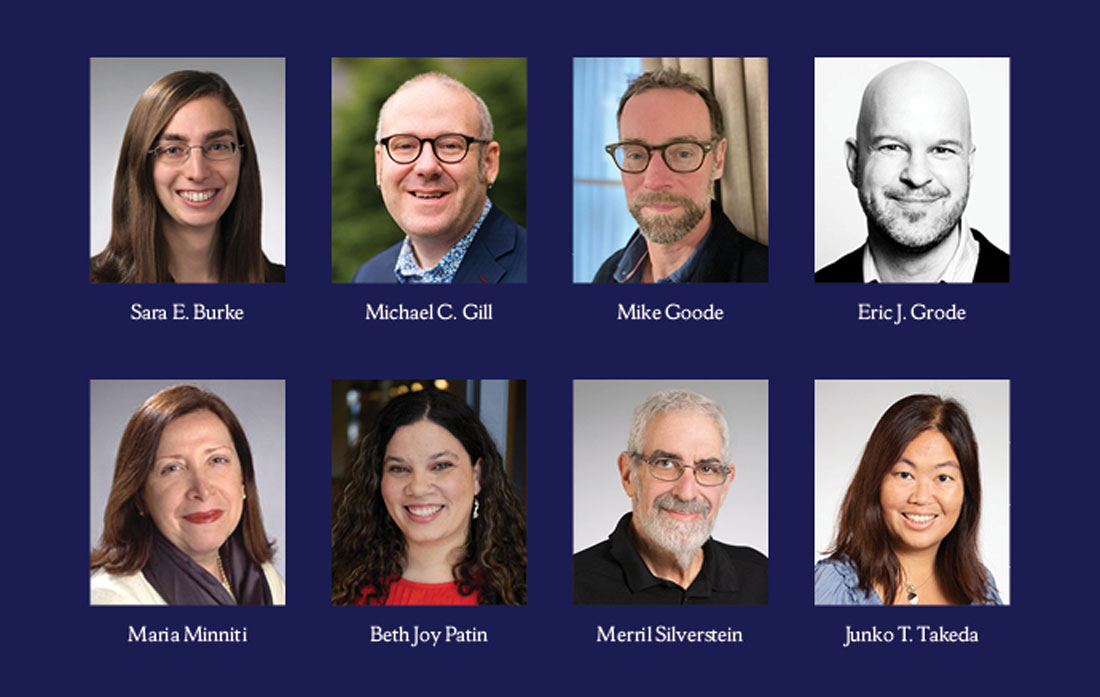
Eight faculty members are recipients of 2023 Syracuse University Graduate School Excellence in Graduate Education Faculty Recognition Awards. The honor is presented to faculty members who have a significant, positive influence on graduate education through their commitment to superior graduate teaching, dedication to departmental and community presence and work in research initiatives.
Winners were selected by an interdisciplinary committee of graduate students. They will be recognized at an award ceremony and reception on Thursday, April 20, along with the recipients of the Outstanding Teaching Assistant award. The ceremony is at 3:30 p.m. in the Syracuse University Sheraton, Regency Ballroom C.
The award winners are:
- Merril Silverstein, professor of sociology and inaugural recipient of the Marjorie Cantor Endowed Professorship in Aging Studies in the Maxwell School of Citizenship and Public Affairs, and professor of human development and family science in Falk College
- Sara E. Burke, assistant professor of psychology in the College of Arts and Sciences
- Michael C. Gill, associate professor of disability studies and cultural foundations of education in the School of Education
- Mike Goode, professor of English and William P. Tolley Distinguished Teaching Professor in the Humanities in the College of Arts and Sciences
- Eric J. Grode, associate professor and director of the Goldring Arts Journalism and Communications program and associate professor of magazine, news, and digital journalism in the S.I. Newhouse School of Public Communications
- Maria Minniti, professor of entrepreneurship and emerging enterprises and Bantle Chair in Entrepreneurship and Public Policy in the Martin J. Whitman School of Management
- Beth Joy Patin, assistant professor of information studies and co-founder of the Library Information Investigative Team research group in the School of Information Studies
- Junko T. Takeda, professor of history and inaugural Daicoff Faculty Scholar in the Maxwell School of Citizenship and Public Affairs
Scholarship and Graduate Mentoring
Silverstein, principal investigator of the Longitudinal Study of Generations, says his method of mentoring graduate students “involves shepherding them through their graduate programs and integrating their course requirements with product-oriented goals.” He encourages students to attend and present at conferences, introducing them to notables in the field and professionally socializing them to the norms, procedures, and logic of scientific inquiry as well as to hone their critical thinking skills.
Burke’s research focuses on intergroup bias, including stereotypes, discrimination, prejudice, and experiences of stigma. She says her “top career priority is providing compassionate, individually tailored expert guidance to doctoral students.” Burke offers accessible information about her Intergroup Bias Lab research findings and its lab manual. She demonstrates a commitment to diversity and inclusion by creating a welcoming environment through her in-depth explanations and exclusive videos of the “R” statistical computing environment, material that supports learning the R computer programming language.
Gill’s research interests include feminist and queer disability studies; intellectual disability and sexuality; intersections with gender, race, and science; and masculinity studies. He says he approaches his teaching “with a goal to generate and foster student interest while presenting diverse materials and methodologies…that connect to [students’] experiences and needs and encourage them to critically engage with communities of which they are a part.” Gill helped establish the Engaged BIPOC Scholar-Practitioner Program and has advised students who participate in the Graduate School’s Future Professoriate Program.
Goode specializes in late 18th and early 19th century British literature and culture with writings on historical reenactments, living history museums, the gender of history, the erotics of historicism, the comic public sphere and the ethics of the postmodern condition. He says he fosters graduate student success by “working very closely with individual students to develop their thinking, writing, teaching and presentational skills.”
Grode’s approach to ensuring a fulfilling graduate experience starts by understanding students’ goals, ambitions, deficits, and gifts. He says he creates opportunities to fully prepare his students to enter the job market “by fortifying them with the tools they need then offering continued mentorship as they pursue their careers.”
Minniti specializes in international migration, immigrant politics, the sociology of religion, race and ethnicity and qualitative methods. She mentors students from a holistic perspective by “being present, available and involved, treating…each student as an individual with untapped potential” and providing practical guidance, encouragement, and insight to help them navigate their entry into their professions.
Patin says she believes that “two of the most rewarding tasks in academics are teaching and mentorship…imparting knowledge to the next generation of scholars and researchers.” She is recognized for creating an environment where students become critical thinkers and informed individuals who explore and challenge the status quo and who understand why the concept of culture is important in today’s society.
Takeda specializes in early modern European history, France, Mediterranean, economic globalization, state-building and revolutions, migration, history of medicine and disease and Asian-American history. She says she “tries to provide as many opportunities as possible for my students to start learning professional skills and to develop their own confidence early in their careers.” She and a colleague helped develop the CNY Humanities Corridor working group and provide an inclusive and friendly venue for Ph.D. students to share their research.
Harlan London Remembered
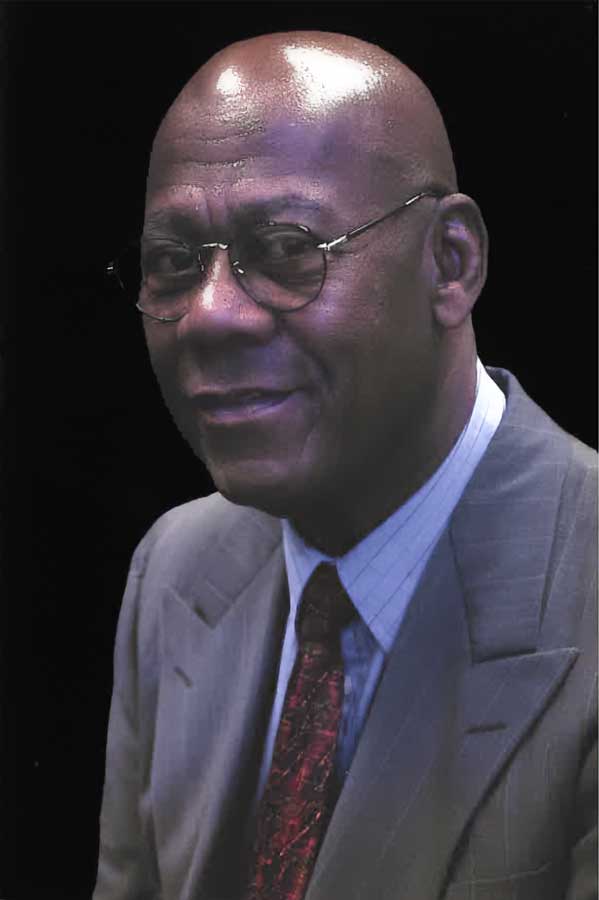
Harlan London, professor emeritus of child and family studies (now the Department of Human Development and Family Science) in the Falk College, died on Dec. 19, 2022. He was 93.
London was a teaching faculty member for 24 years and a chair of the Department of Child and Family Studies in the College of Human Development (now the Falk College). He worked with his wife of 54 years, Syracuse University alumna and City of Syracuse teacher Arcenia Phillips London, on instructing teachers how to teach with an emphasis on diversity. He was a leader in the Alpha Phi Alpha fraternity’s mentoring program for high school male students as they transition to college.
When he retired in 2006, London was advisor to the University’s vice chancellor and provost on diversity in the curriculum.
“Our hearts are with Harlan’s family and friends as they mourn the loss of a loving husband and father and a devoted educator whose legacy will live on through the thousands of his former students who share his compassion for others,” says Diane Lyden Murphy, dean of the Falk College.
A native of Ethel, Arkansas, London was an active member of the choir in high school, which led to a music scholarship to attend Philander Smith College (PSC), a historically Black college and university in Little Rock, Arkansas. There, he sang with the internationally renowned PSC choir.
Before moving to Syracuse in 1961, London earned a bachelor’s degree in social science at PSC, a bachelor of divinity degree at Gammon Seminary in Atlanta, Georgia, and a master’s degree in counseling at Boston University. He earned a Ph.D. in social science at the Maxwell School. After completing his Ph.D., London taught in Amsterdam, Netherlands, for one year through Syracuse University’s Division of International Programs Abroad, now known as Syracuse Abroad.
London taught at all levels from first year to advanced graduate studies, directed Ph.D. dissertations and participated in the completion of many. He was a skilled researcher and a respected scholar who loved teaching undergraduate students above all other work. His research and publications focused on urbanization, family structure, social class, ethnicity and education. He maintained affiliation and leadership in national organizations of family studies over a span of his career.
“He was a gentle giant who taught some of the early courses on diverse family systems,” says Jaipaul Roopnarine, Pearl S. Falk Professor of Human Development and Family Science who worked with London as a young faculty member. “Above all, he was a very kind and caring person who always displayed humility and compassion.”
London and his family belonged to the Rockefeller United Methodist Church for over 50 years. Music was London’s great love—sacred, classical, jazz and spirituals. He returned to singing Negro spirituals after retirement and was a frequent soloist at many churches across the Syracuse community until his death. London’s family described him as a loving dad, a family historian, a gourmet cook, a skillful gardener, a landscape artist and a loyal friend.
London was predeceased by his parents Robert Sr. and Marie; his wife, Arcenia; brothers, Ernest, Marian, Robert Jr. and Marvin; sister, Rosemary; and son, Doran. He is survived by his children, Judy London (Harold) Palmer of Corpus Christi, Texas, and David Harlan London of Baltimore, Maryland; his grandchildren, David Palmer of Sacramento, California and Jaren Palmer of Corpus Christi, Texas; his siblings, Dorothy London Ross of Milwaukee, Wisconsin/Las Vegas, Nevada and Mel London of Milwaukee, Wisconsin; sister-in-law Mattie Phillips London of Dewitt, Arkansas; and several nieces, nephews, relatives and friends.
Falk Students Among IVMF Fellowship Recipients
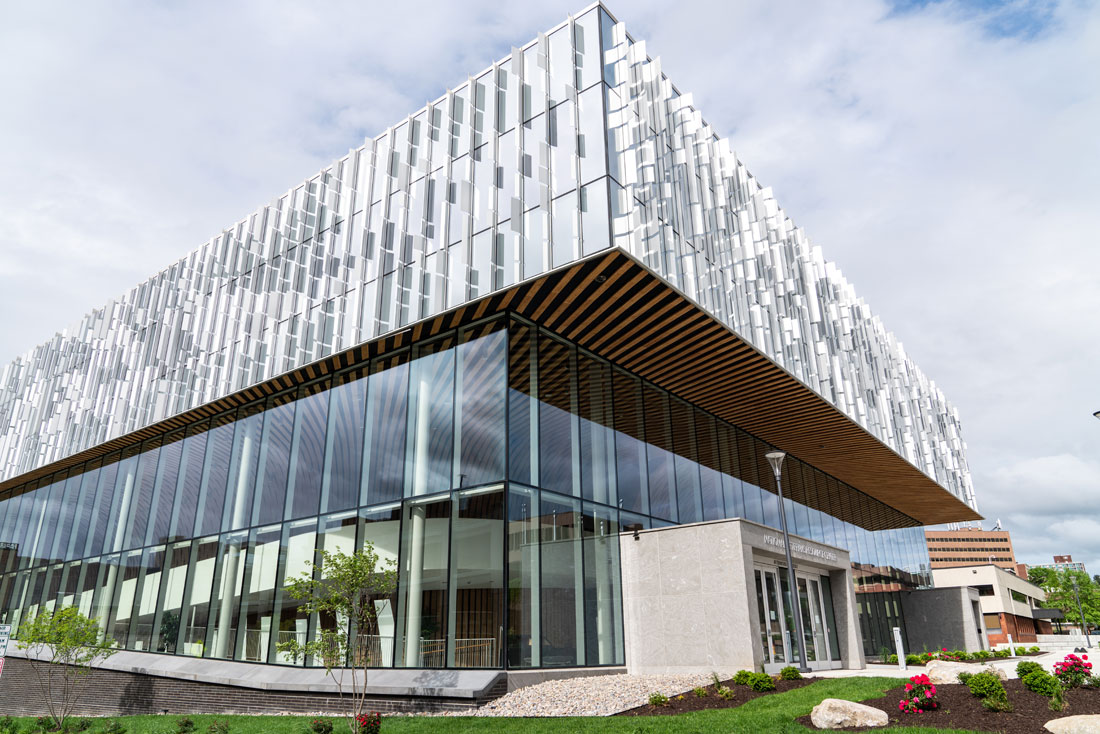
Jacob DeBlois, Kyle Leister, and Rachel Linsner are being awarded financial support for their research projects through the Bernard D. and Louise C. Rostker IVMF dissertation research fund. Totaling more than $50,000, the funding supports interdisciplinary dissertation research on topics related to veteran and military families conducted by Ph.D. candidates through the D’Aniello Institute for Veterans and Military Families (IVMF).
As an R1 research institute, it should come as no surprise that Syracuse University is a source for groundbreaking research across the vast array of disciplines available throughout its 13 schools and colleges. To conduct quality research, it can be a challenge to obtain the required funding. Surveys, focus groups, experiments, interviews and even observations require expenses, and that is before there is an attempt to publish the research and present it at conferences.
“The field of veterans studies crosses many disciplines and modes of inquiry, and this is certainly reflected in our five inaugural recipients,” says Nick Armstrong G’08, G’14, IVMF managing director for research and data. “The generous support provided by the Rostkers exemplifies what makes Syracuse University best-in-class and best for veterans—it provides rising scholars the resources and flexibility to pursue distinctive excellence, while at the same time addressing some of the leading challenges facing the veteran community.”
The funding, provided by Bernard G’66, G’70 and Louise Rostker G’68 through the Forever Orange Campaign, did not come with the typical restrictions due in part because of the personal experiences the couple went through in pursuing their own advanced degrees. The Rostkers have spent years dedicating time in support of military families. Bernard is a veteran of the U.S. Army and later served as a senior executive in the Department of Defense and Louise devoted herself to her lifetime career in social work, having a history of supporting education for military children and expanding employment opportunities for military spouses.
The combined total of $50,000 in funding will be dispersed between five recipients this year, each of whom have a research topic focused on the military-connected community. Learn more about Falk College’s 2022 fellowship recipients:
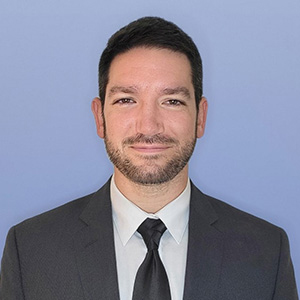
Jacob DeBlois
Ph.D. Candidate, Exercise Science
DeBlois’ research interests focus on the contribution of occupational stressors to the risk of cardiovascular disease. The topic first caught his attention during his undergraduate studies after working on projects funded by the Department of Homeland Security investigating firefighting tactics and the impact of those tactics on physiological outcomes. His dissertation, “The Occupational, Psychosocial, Biobehavioral and Physiological Determinants of Hypertension Risk Among Military Service Members,” seeks to explore the impact of occupational stressors on hypertension risk among a nationally representative sample of service members to determine if those with military combat exposure, injury or trauma and prolonged overseas deployments have higher blood pressure or physician diagnosed hypertension than those without similar experiences.
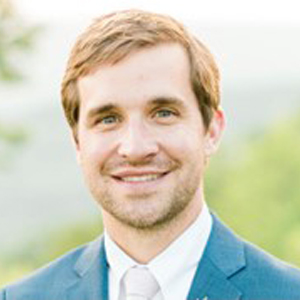
Kyle Leister
Ph.D. Candidate, Exercise Science
Leister’s research interests are focused on improving quality of care for amputees. Leister is a certified orthotist/prosthetist and has over seven years of practice and continues to treat patients in the clinical setting on a part-time basis. His dissertation, “Development and Cross Validation of a Prediction Equation for Estimating Step Count in Individuals With Transtibial Amputation,” seeks to develop and cross validate two equations to estimate daily step count based on two common clinical-based functional outcome measures and one patient-reported outcome measure.
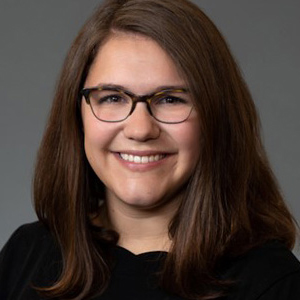
Rachel Linsner
Ph.D. Candidate, Human Development and Family Science
Linsner’s research interests focus on military families, specifically within child and family policies. She first started with the D’Aniello Institute in 2015 as a student researcher and is now a full-time research associate working in the research and evaluation division. Her dissertation, “Military Spouse Employment Status: Implications for Attitudes Toward the Military, Individual, Well-Being and Family Functioning,” will examine the relationships between military spouse employment status, attitudes towards the military, individual well-being and family functioning.
About Forever Orange: The Campaign for Syracuse University
Orange isn’t just our color. It’s our promise to leave the world better than we found it. Forever Orange: The Campaign for Syracuse University is poised to do just that. Fueled by more than 150 years of fearless firsts, together we can enhance academic excellence, transform the student experience and expand unique opportunities for learning and growth. Forever Orange endeavors to raise $1.5 billion in philanthropic support, inspire 125,000 individual donors to participate in the campaign, and actively engage one in five alumni in the life of the University. Now is the time to show the world what Orange can do.
~ Adapted from an SU News story by Charlie Poag originally published on Wednesday, November 30, 2022.
Learning ‘New and Exciting Things’
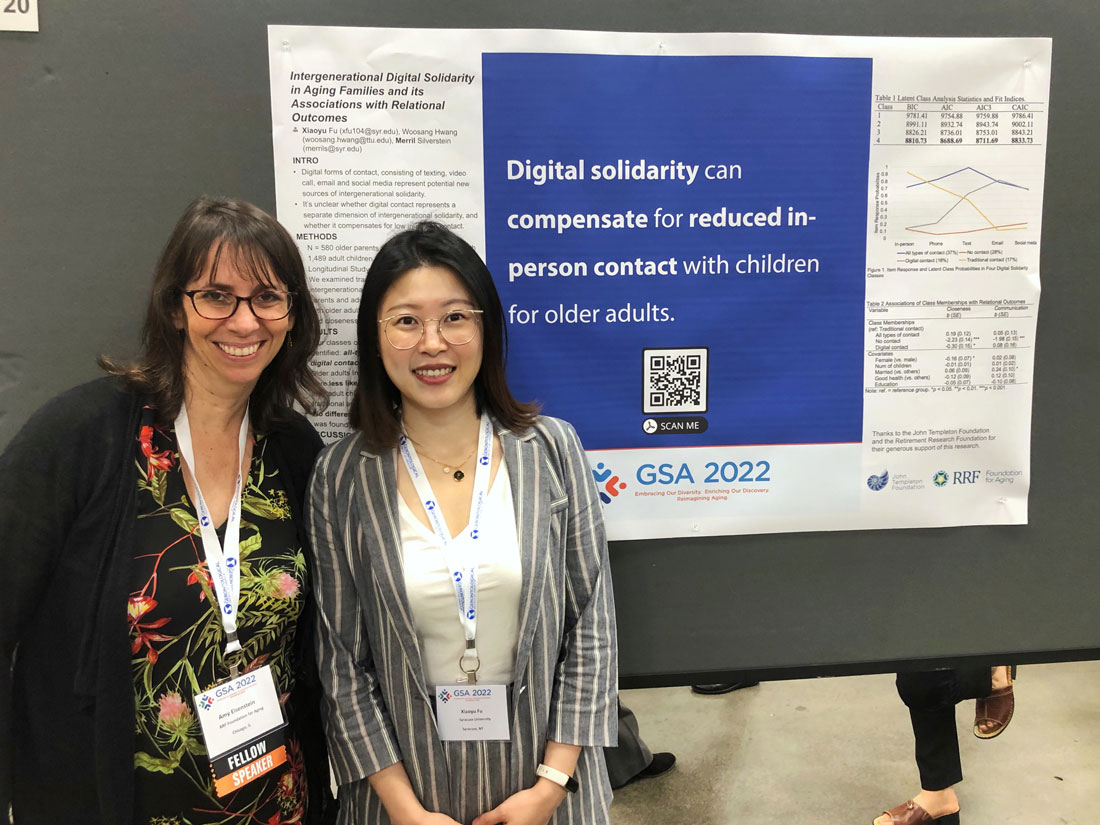
Growing up in Jiangxi, a province in southeast China, Xiaoyu Fu discovered she had a passion for family dynamics and family relationships. To transform that passion into a career, Fu enrolled in the Department of Human Development and Family Science at Falk College.
“I found the HDFS department at Syracuse University is the perfect place for me to dive into the research field of family relations under the guidance of many renowned professors and researchers,” says Fu, a Ph.D. candidate. “I hope to become a faculty member at a university after graduating from Syracuse.”
Fu recently attended the Gerontological Society of America (GSA) Annual Scientific Meeting in Indianapolis, Indiana, where she presented research on how older adults react to various types of communication with their adult children. This research was supported by a grant from the Retirement Research Foundation (RRF). We asked Fu to share her thoughts on the conference and how it impacted her academic and career goals, and here’s what she wrote:
“The Gerontological Society of America (GSA) Annual Scientific Meeting is one of the biggest conferences in the field of gerontology. By bringing the top scholars around the world together to share their cutting-edge research projects and findings, it offers an extensive amount of high-level research from different aging research disciplines.
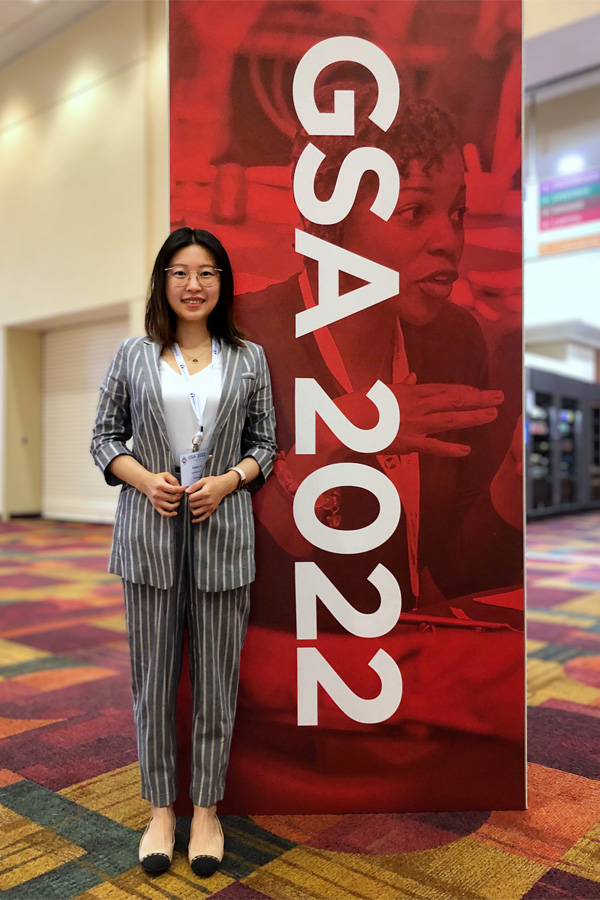
“Due to the pandemic, the GSA 2022 conference was my first in-person conference, and it surprised me with a wonderful experience that’s distinct from virtual conferences. One of the highlights of GSA was meeting so many talented researchers. I’ve read and cited many of their publications, and this was the first opportunity I had to see them in person or attend their presentations.
“In addition to meeting those well-established scholars, GSA allowed me to network with Ph.D. students and postdoctoral researchers from all over the world. I attended a meetup of international students and scholars where we got to know each other and share challenges and resources in pursuing a career in academia as a non-citizen. Another highlight of GSA was attending conference sessions and workshops presented by scholars from various disciplines, such as social work, neuroscience, gerontology, biology, sociology, and medicine. I learned many new and exciting things at GSA about issues that affect older people and how they live their lives.
“The research project I presented at the conference was about how different types of communication between older adults and adult children would impact older adults’ relational outcomes. I was drawn to this topic because it intimately relates to my life as my parents and I live on two continents. It’s also immensely relevant in today’s increasingly digital world.
“Specifically, we investigated the traditional (in-person and phone call) and digital (instant message, email, social media) types of intergenerational communication and their associations with older adults’ perceived quality of communication and closeness with children. We found that digital contact with children can compensate for reduced quality of communication related to social isolation. We plan to replicate this study using recently collected data from 2021-22 to further examine the role of digital communication in maintaining meaningful family relationships during COVID-19.
“(Marjorie Cantor Professor of Aging Studies and HDFS Graduate Director) Merril Silverstein, my advisor, provides constant support for our projects and his wealth of knowledge guides our path. I am deeply grateful for his ongoing encouragement, guidance, and support of all my efforts and struggles on this project. It’s been a pleasure working with him and I have learned a lot.”
About Xiaoyu Fu: Xiaoyu received her bachelor of science in international studies from Renmin University of China, and her master of arts in public administration from Northeastern University. Her advisor is Professor Silverstein and her research interests are intergenerational relationships and family well-being.
About HDFS: The scientific study of individuals and families offered through Falk College’s Department of Human Development and Family Science focuses on social, physical, emotional, and behavioral life-span development across cross-cultural contexts. HDFS offers students invaluable and unlimited opportunities for real world projects, internships and experiential learning, and research.
Diane Lyden Murphy Concluding Tenure as Dean
A longtime member of the Orange community, Diane Lyden Murphy ’67, G’76, G’78, G’83, dean of the David B. Falk College of Sport and Human Dynamics, has had an impactful, accomplished career at Syracuse University—as a student, faculty member and academic leader. Today, Murphy announced her plans to conclude her tenure as dean at the end of the academic year in 2023. A search for her successor will begin in January 2023.
“Diane has been a force of nature at Syracuse University since she arrived on campus nearly 60 years ago,” says Chancellor Kent Syverud. “She’s an innovator who inspires and engages others in transformational initiatives. Through her work in sexual and relationship violence, gender equality, diversity, inclusion and accessibility, Diane has both enhanced the student experience and helped our Orange community become a more welcoming place for students, staff and faculty.”
“In the years I’ve been at Syracuse University, I’ve been incredibly impressed with Diane’s work,” says Vice Chancellor, Provost and Chief Academic Officer Gretchen Ritter. “As a fierce advocate for her college and some of the University’s most important initiatives, she has an extraordinary ability to communicate with and engage others in what is truly important to the University experience. She is highly respected and for good reason because she is a person of high integrity.”
Murphy says serving her alma mater all these years, especially in her most recent role as Falk College dean, has been the honor of a lifetime.
“It has been an extraordinary privilege to be able to integrate my life’s work and focus as an activist scholar, social worker and social policy faculty with a career that articulates this effort in many ways over the years,” Murphy says. “I have built a cherished network of friends and colleagues that focus on matters of social justice and progressive peace work for both the community and the university, and together we have moved these communities forward.”
Appointed as dean of the College of Human Services and Health Professions in 2005, Murphy expanded that college with the Department of Sport Management to create the David B. Falk College of Sport and Human Dynamics in 2011. Murphy led a successful effort to integrate these disparate but complimentary curricula into one college, which moved into the White Hall-McNaughton Hall complex in 2015, physically bringing their departments together for the first time.
In addition to forging and shaping the Falk College, Murphy established a college Research Center and launched new undergraduate majors and minors, and several graduate programs. Her commitment to global education has resulted in study abroad opportunities throughout the Falk College. Her dedication to accessibility and global outreach led to groundbreaking new online programs, including online graduate programs in social work and marriage and family therapy. She helped create the food studies and sport management majors; launched the nation’s first bachelor’s degree in sport analytics; and integrated the Department of Exercise Science into the college. Murphy also led the creation of Falk’s Department of Public Health, and spearheaded collaborations with other colleges, including the School of Education, the College of Law and the Martin J. Whitman School of Management.
Mission-driven and passionate about issues of equality, diversity, inclusion and accessibility, Murphy believes that progress results from collective wisdom and collective action.
“We’ve learned a lot from the Haudenosaunee women, the Native women who have always led and been a very important voice, but their men lead with them,” says Murphy. “It’s about empowering people, getting people to the table, because collective voices make the best decisions. You need to have people who have different life experiences because they will think about things you wouldn’t have thought about.”
Murphy applied this passion to several critical leadership roles on campus. In August of 2021, she was one of a three-person interim leadership team appointed by Chancellor Syverud to advance the University’s diversity, equity, inclusion and accessibility (DEIA) priorities and strategic planning efforts. Murphy also serves as co-chair of the Chancellor’s Task Force on Sexual and Relationship Violence, a role she’s held since 2017. And, during former Chancellor Kenneth A. Shaw’s tenure, she served as a consultant to him on women’s issues while director of women’s studies. In that role she co-founded the University Senate Committee on Women’s Issues while also co-writing the University’s first Sexual Harassment Policy, Domestic Partnership Policies, Adoption Policies and Gender Equity Studies with the goal of elevating Syracuse’s commitment to a family friendly environment.
Murphy is a four-time Orange alumna. She earned a bachelor’s degree in sociology, a master of social work degree, a master’s degree in social science and a Ph.D. in interdisciplinary social science, all from Syracuse University. She became a member of the University’s social work faculty in 1978 and also served as director of the women’s studies program in the College of Arts and Sciences from 1989-2005, where it became a department with tenured faculty scholars and built the first B.A. and certificate in women’s studies at Syracuse University. She has also served as an elected faculty member of the Syracuse University Senate since 1980.
Committed to Student Success
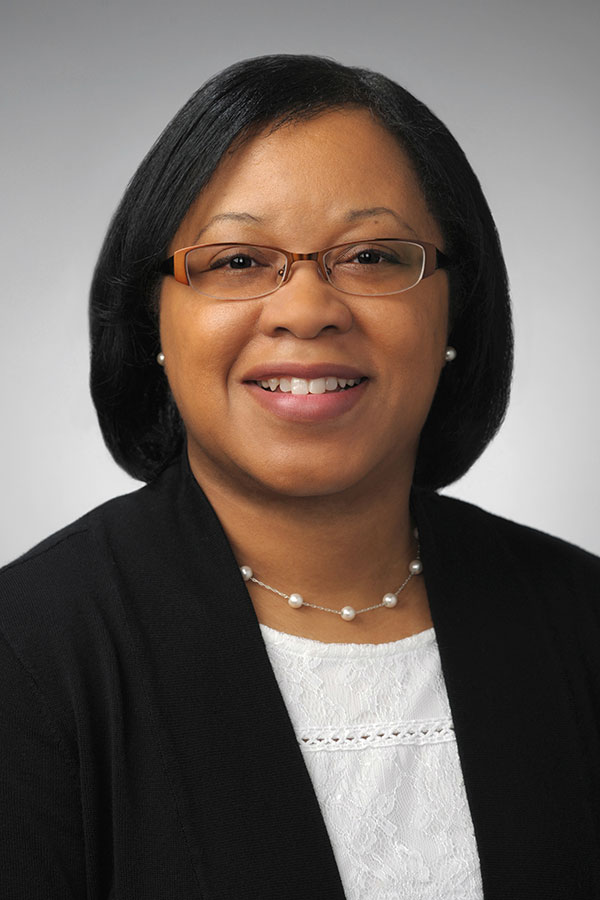
As a non-traditional, first-generation undergraduate student at Syracuse University, Chandice Haste-Jackson excelled academically but always felt there was something missing in her pursuit of knowledge.
That missing piece? Connecting with others.
“Ultimately, I discovered that in connecting with others, I could expand my knowledge and understanding beyond anything I learned from textbooks,” Haste-Jackson says. “That set me on a career journey oriented toward human connection, holistic development, and service, whether that be in fields of teaching, counseling, leadership, or administration.”
This past summer, Haste-Jackson’s lifelong journey of connecting with others continued with her appointment as Associate Dean of the Office of Student Services in Falk College. An associate teaching professor in Falk’s Department of Human Development and Family Science (HDFS), Haste-Jackson previously held several prominent HDFS positions and was chair of the Dean’s Committee on Diversity and Inclusion. In 2021-22, Haste-Jackson served as Syracuse University’s interim director of the First-Year Seminar course.
Before joining Syracuse University, Haste-Jackson was drawn to work that supported vulnerable populations. It was her job, she says, to help those populations expand their understanding, move from deficit toward sufficiency, and identify what wholeness, health, and stability meant to them and/or their families.
“Was this difficult work at times? Yes!” Haste-Jackson says. “But what I gained from these experiences is that our humanity connects us all, even those who are not like ourselves. We all want similar things–health, happiness, longevity, stability–and that makes us more interconnected than we think we are.”
To introduce Haste-Jackson to Falk students, we asked her to discuss her previous experience with students, the services offered by the Office of Student services, and questions that students might ask. Here’s that conversation:
What attracted you to your new job and why is it important that you’re helping Falk College students succeed?
After 20 years of working in nonprofit organizations and schools, rising through the ranks of direct service to executive leadership and administration, I spent a good deal of time teaching and training frontline employees and college student interns. In working with college student interns, I developed a desire to teach, mentor, and prepare the next generation of human service workers, a field that is very broad but one that involves human connection, holistic development, and service–tenets I live my life by!
Given the climate in which we live in today, college students are dealing with issues that may impact their ability to successfully engage in academic pursuits. The COVID-19 pandemic, mass racial violence, wars, and significant personal losses have impacted academic performance and emotional well-being. Helping students to navigate these challenges during their time with us in Falk College is what I endeavor to do, and I am committed to leading and supporting the professional staff in our office who have made that same commitment to student success.
I’m a first-year or transfer student who isn’t familiar with the Office of Student Services. What are the services you provide?
In your first year at Syracuse University, our office will provide academic counseling and advising around other areas in your life that you identify as being important to your growth as a student in Falk College. Additionally, our office supports career exploration and professional skill development, and offers opportunities for learning through career immersion experiences.
Every first-year and transfer student has an assigned academic counselor, and the Office of Student Services will be one of the first places that you connect with to learn more about your major and all the resources available at Syracuse University.
I’m a student struggling with my classes and I’m not sure if I’ve chosen the right major. How can you help?
This is common for students who are adjusting to the intensity of college-level work. We can help you identify the source/cause of the struggle with your classes and then locate campus resources that you might consider accessing for help.
Sometimes, making a change in how you study, how much time you give to studying, or even where you study is all that may be needed to alleviate the struggle. Sometimes, motivation is at the root of the struggle and subsequently causes you to consider if the major is right or not. We’ll help you to explore and develop a pathway to successful academic performance.
I’m a student having a hard time being away from home and I’ve got personal issues that are getting in the way of my sleep, classwork, and social life. Do I go to you or somewhere else?
You most certainly can meet with your academic counselor to discuss these personal issues. Our academic counselors will listen and help you find the resources that are right for you and meet your needs. You do not have to be alone in trying to address emotional, social, or academic well-being.
We also recommend that students contact the Barnes Center at The Arch and/or Hendricks Chapel for support with any personal issues that arise. We are well-connected to these two resources and support student engagement with their services.
Why is it important for students to see you if they have issues rather than trying to work them out on their own? Isn’t that what college is for, learning how to handle stress?
Absolutely! Learning how to handle stress is an expectation of a college student, yet many students are not prepared for the inherent stress that comes with transitioning to college. During the first year of study or even subsequent years, there are a series of social, emotional, and academic adjustments that must occur for you to be successful as a college student. There will be some new stressors, and some of your past ways of handling stress may not be as effective for you now.
Being proactive in seeking help before something becomes an issue is also something that college students are expected to learn early in their college career. We can help you to learn these skills and support you along the way as you employ them.
Help is Here
The Falk College Office of Student Services is in Suite 330 Barclay Hall. You can visit at any time or schedule an appointment by calling 315.443.3144 or emailing falkss@syr.edu. Visit the Office of Student Services webpage for more information and a complete list of services, important announcements, and staff directory.
Usdansky Named Interim Director of CTLE
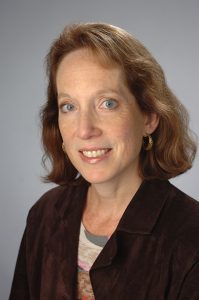
Margaret Usdansky, founding director of the Center for Learning and Student Success (CLASS) and research associate professor of human development and family science in Falk College, has been named as the interim director of the Center for Teaching and Learning Excellence (CTLE).
Usdansky succeeds Martha Diede, founder of CTLE, who has left the University.
“Margaret has extensive experience in the study of learning and in developing strategies to help students reach their academic goals,” says Chris Johnson, associate provost for academic affairs and professor of civil and environmental engineering in the College of Engineering and Computer Science. “Her experience translates well into helping promote teaching practices that promote student learning.”
The CTLE supports and develops Syracuse University faculty through collaboration. By offering a variety of services, the CTLE promotes effective, inclusive, innovative teaching. Evidence-based practices include individual consultations; classroom observations and feedback sessions; syllabus reviews; the development of college, school, and department-specific workshops; assistance in reviewing and responding to student feedback; and knowledge co-creation related to general and specific teaching questions. The Office of Academic Affairs will be assessing best practices and models for teaching and learning centers at peer institutions before launching a search for new leadership in the center.
A sociologist and demographer, Usdansky is interested in cognitive science research on how human learning does—and does not—work. She studies how academic support programs can help students use research-based study strategies to meet their academic goals, including in subject areas they’ve previously found challenging. Usdansky also teaches in the Renée Crown University Honors program.
Dean Murphy Welcomes Falk Students
Dear Falk Students,
Finally, our beautiful campus is packed with energy after the quiet summer months. It’s great to see our returning Falk students—we’re so glad to have you back! Please join me in giving a big Orange WELCOME to the Class of 2026, and to our new transfer and graduate students! Our Falk family just got a whole lot bigger.
As we share in the excitement of a new semester, I want to remind you of some important information that will help you navigate life on campus.
Official Syracuse University Communications
Syracuse University email is the primary communication method at the University. Your professors and University offices will contact you with important information using your Syracuse University email address (ending in “@syr.edu”), not your personal email address. It’s important to read your University email at least once every day so you’re aware of the latest information that’s essential to you.
Public Health Information
Public health remains a critical priority for life on campus. Please review the Fall 2022 Public Health Guidelines. We fully expect all Falk College students to follow University public health guidelines. For public health information and updates, please visit the Stay Safe website, the official source of public health information for Syracuse University. Thank you for doing your part to keep our community safe and healthy.
Student Support Services
Falk College Student Services is an important resource in your support system at Syracuse University. Student Services counselors are here to provide you with academic advising and help you meet your requirements and goals. In addition, they are your resource for private consultation related to student social and emotional concerns. If you have any concerns throughout your academic career, please contact Student Services or visit Suite 330 Barclay Hall in the Falk Complex.
I encourage you to connect with the staff at Falk Career Services, who can help you prepare for life after college through career exploration, internship and job searching, professional networking, and more. They are also located in Suite 330 Barclay Hall, or you can search for opportunities through Handshake, the University’s job search and professional events portal.
In addition, you can connect to spiritual life on campus at Hendricks Chapel, as well as health and counseling services in the Barnes Center at the Arch.
Student Spaces in Falk College
The Student Lounge, located in Falk 216, is available to you anytime the Falk Complex is open. The lounge has a microwave, refrigerator, and vending machines for student use. Across the hall is the Falk Café on 2, open 8:00 a.m. to 3:00 p.m. Monday through Thursday and 8:00 a.m. to 2:00 p.m. Friday starting September 6. Visit the Food Services website for up-to-date operating hours for cafés and dining centers across campus. Just down the hall is Falk 229, the quiet student lounge.
There are several computer labs in the Falk Complex. Falk 113 is a PC lab, and Falk 229 is a quiet study area that has both PCs and Macs available for your use. Both spaces are available to students at any time. Falk 400 and 407 are PC labs that are also used as teaching classrooms. When class is not in session, they are open for student use. You may check their schedule of availability using the 25Live website. You may also use the quick-print stations in Falk 216 and 229 for printing and email. These stations log out automatically after 15 minutes of use.
Ways to Get Involved
The Student Involvement Fair will be held Thursday, September 8, on the Quad from 4:00 to 7:00 p.m. There are more than 300 student organizations at Syracuse University. Be sure to explore organizations that might be outside your usual interests, too. Remember, this is a great way to meet new people and discover something new about yourself!
There are many exciting events planned for Fall 2022, including two signature Syracuse University events: Family Weekend October 14-16 and Orange Central, Syracuse University’s annual homecoming and reunion weekend, September 29-October 2. You can discover activities and events on campus by visiting the Syracuse University Calendar.
There are so many ways to connect, express, and grow at Syracuse University, and these are just a few suggestions to get you started. I encourage you to visit the Syracuse University For Students page for more resources and opportunities to make the most of your Syracuse experience.
I wish you the best as you begin (or continue) your Orange story. Best of luck to each of you. We’re excited to see all that you will accomplish this year.
Go Orange!
Diane Lyden Murphy, M.A., M.S.W., Ph.D.
Dean
Falk College
Page 8 of 25
